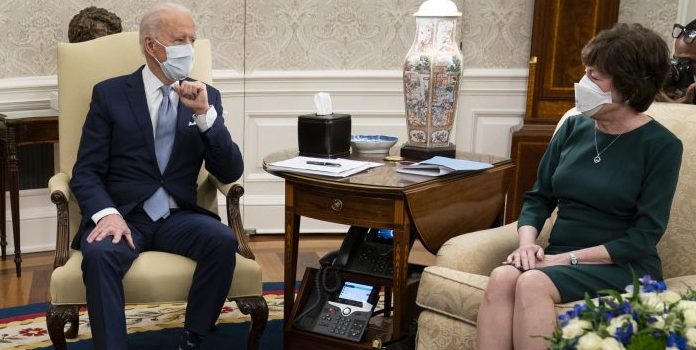(Headline USA) Democrats were picking up the pieces Thursday following the collapse of their top-priority “voting rights” legislation, with some shifting their focus to a narrower bipartisan effort.
Though their bid to dramatically rewrite U.S. election law failed in spectacular form during a high-stakes Senate floor showdown late Wednesday, Democrats insisted their brinksmanship has made the new effort possible, forcing Republicans to relent, even if just a little, and engage in bipartisan negotiations.
“We know history is on the side of voting rights, and we know that forcing leaders to take stands will ultimately move the ball forward,” a defeated Senate Majority Leader Chuck Schumer said Thursday.
In reality, many Republicans had welcomed the bipartisan discussions from the outset and had previously offered to work with Democrats on efforts to amend the Electoral Count Act, an 1887 law that created the convoluted process for the certification of presidential election results by Congress.
For more than 100 years, vulnerabilities in the law were an afterthought, even as Democrats exploited it to challenge the outcome in many a Republican victory.
However, the Jan. 6 uprising at the US Capitol underscored the need to clarify finer points, such as the vice president’s role in presiding over the Joint Session of Congress when it meets to certify the Electoral College’s vote.
An overhaul of the Gilded Age statute could be Democrats’ best chance to address what they call an existential threat to American democracy—although a bipartisan bill is unlikely to help them codify controversial policies that enabled vote fraud in the 2020 election under the auspicies of “emergency” pandemic orders.
But with serious talks only beginning in the Senate and dwindling time before this year’s midterm elections, reaching consensus could prove difficult.
Just weeks ago, many Democrats were adamant that updating the Electoral Count Act was no substitute for their voting legislation. Updating the 1887 law, they pointed out, would do nothing to counter the Trump-inspired push by 19 states to shore up loopholes in their election laws that were exploited in 2020.
“It doesn’t matter if your votes are properly counted if you cannot cast your vote in the first place,” said Sen. Raphael Warnock, D-Ga., who benefitted greatly from pandemic-era provisions such as unmanned absentee ballot drop-boxes in deep-blue Fulton and DeKalb counties.
Democrats still hold that position, but after the defeat of their marquee elections bill, they are running out of options.
“What other things could be put in there?” said South Carolina Rep. Jim Clyburn, the No. 3 House Democrat and a senior member of the Congressional Black Caucus.
Clyburn and others still faced difficulty letting go of their entrenched positions while pushing reckless rhetoric that falsely characterized GOP laws and positions.
“I want to deal with more than just counting the votes for the president,” he complained. “I want to be sure that we count the votes for everybody else. So voter nullification like they’re doing in Georgia, I think it can be addressed.”
There is nothing in the Georgia law either, either before or after the recently passed legislation, that permits or supports the nullification of votes.
Meanwhile, Republicans are girding for the next election, working to root out corrupt activist officials in local election posts as many anticate that the failed policies of the Biden administration and the alarming government overreach will yield to a red wave similar to that of the Obama administration’s 2010 midterm.
Biden conceded this week that updating the electoral bill may be Democrats’ best opportunity to pass voting legislation through a 50–50 Senate, where much of his agenda has stalled.
“I predict to you they’ll get something done,” Biden told reporters Wednesday.
Sen. Susan Collins of Maine is holding bipartisan talks with Republican Sens. Roger Wicker of Mississippi, Thom Tillis of North Carolina and Mitt Romney of Utah, as well as Democratic Sens. Joe Manchin of West Virginia, Jeanne Shaheen of New Hampshire and Kyrsten Sinema of Arizona.
“It’s such a needed thing,” said Manchin, who added that the narrower scope was “the first place” Democrats “should have started.”
Collins has proposed new protections for poll and elections workers, some of whom received chilling threats to their safety after the 2020 election. She has also called for more funding for local elections.
Manchin wants harsh criminal penalties for those convicted of intimidating or threatening poll and election workers.
“It’s a heavy lift, but if we continue to get people to talk there’s a path,” said Tillis, who said tensions over the Democrats’ failed voting bill will need to cool before coalition building can seriously begin. “We are going to have to have more Republicans get on board because there are going to be protest votes.”
Meanwhile, NeverTrump RINOs and radical leftists alike see the effort as a prospective bludgeon against allies of former President Donald Trump.
“This is directly related to Jan. 6,” Senate Minority Leader Mitch McConnell, R-Ky., said Thursday. “It needs fixing.”
Democrats plan to campaign heavily on Jan. 6 in the upcoming election, attempting to paint conservatives as a domestic terrorist threat.
Some political operatives are seeking ways to render the 147 Republican lawmakers who supported Trump’s procedural challenges as ineligible to hold office.
Among those working on draft proposals for the reform is the House’s highly partisan Jan. 6 committee.
Sen. Angus King, I-Maine, a leftist who caucuses with Democrats, also is working on a bill that would shore up several key vulnerabilities in the Electoral College process.
Any legislation should make clear the vice president holds only a ceremonial role, limit the scope of Congress’ involvement in the certification of the election and narrow the grounds for raising an objection to a state’s results, according to a summary provided by his office.
Adapted from reporting by the Associated Press

